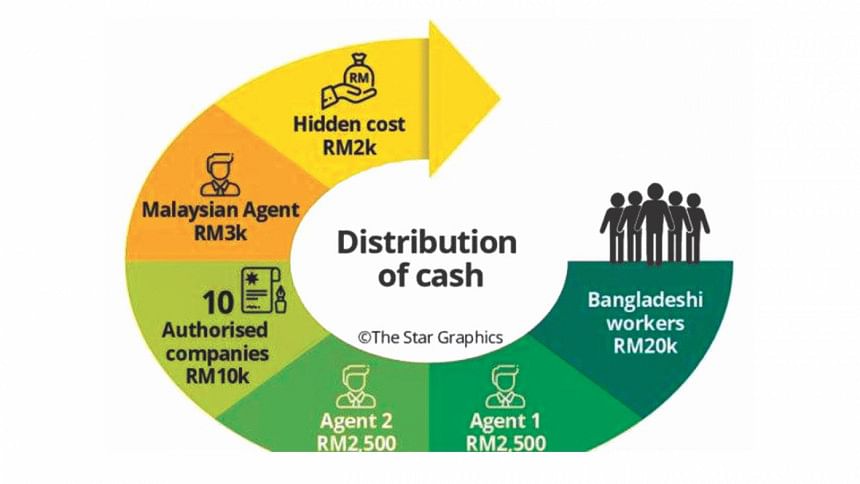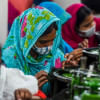Jobs in Malaysia: At the mercy of trafficking gang

An organised trafficking syndicate, led by a Bangladeshi businessman with alleged political connections with the Malaysian home ministry, raked in at least two billion Malaysian ringgits in just two years from Bangladeshi workers looking to secure jobs in the southeast Asian country, Malaysian newspaper The Star reported yesterday.
An investigation revealed that the workers paid RM20,000 (Tk 4 lakh) each to their local agents who then paid half of the sum to the syndicate to have work permit approvals and flight tickets to Malaysia.
It is learned that since late 2016, more than 100,000 Bangladeshi workers have been brought into the country under the system, while more than 100,000 are waiting for their turn.
The Star also reported that the worker recruitment system (G2G Plus) was suspended by Malaysia in the face of alleged recruitment anomalies. However, the Bangladesh expatriates welfare and overseas employment secretary yesterday said she was not aware of any such development.
The report comes nearly more than a month after the political changeover in Malaysia, a popular destination for Bangladeshi workers, but the recruitment process has often been mired with anomalies and abuses of migrants.
Thousands of Bangladeshi workers had to return home from Malaysia in 2009 after it put a freeze on hiring workers following widespread media reports of labour exploitation.
In 2012, Bangladesh and Malaysia had signed a government-to-government deal to reduce migration cost, but only 10,000 Bangladeshi workers could secure jobs under the agreement, thanks to alleged conspiracies of the recruiting agents and brokers.
The two countries had signed the G2G Plus labour recruitment agreement in 2016 amid concern that it would up the migration cost.
The Malaysian newspaper revealed that the Bangladeshi businessman, who has a “Datuk Seri” title, was the mastermind behind the organised multibillion-ringgit “human trafficking scam”. Datuk Seri is the most senior state title conferred to those who have highly contributed to Malaysia.
The newspaper did not reveal the name of the “Datuk Seri”, but added that due to his strong political influence both in Malaysia and Bangladesh, he was instrumental in getting the two countries sign the G2G Plus agreement.
It said only 10 Bangladeshi recruitment agents got the right to recruit migrant workers, leaving out the rest of the over 1,000 agents.
Ruhul Amin, secretary general of Bangladesh Association of International Recruiting Agencies, however, denied the allegations, saying each worker was charged only Tk 37,000 as per the G2G Plus deal.
All the Malaysia-bound workers get emigration clearance from the Bangladesh's Bureau of Manpower Employment and Training (BMET) and approval from the Malaysian home ministry, he told The Daily Star last night.
“How can this be human trafficking?” said Ruhul Amin, now visiting Canada.
The report by The Star is incorrect because some 1.64 lakh Bangladeshi workers went to Malaysia since 2016, not 100,000, he claimed.
Quoting a source, the Malaysian newspaper reported some of the 10 authorised agents were merely fly-by-night companies created solely to rake in money by playing middleman between the workers and their prospective employers in Malaysia.
The newspaper said despite the hefty RM20,000 price tag, the total migration process -- from documentation to transporting the workers to Malaysia -- costs the agents less than RM2,000 a person (Tk 40,000).
“The 'Datuk Seri' has grown richer, his close aides and business associates living lavishly,” said the source.
“The Datuk Seri also shares a portion of the money he makes with politicians and government staff from both the countries,” he said, adding that the man in his late 40s was married to a Malaysian for more than 15 years.
The source said the “Datuk Seri” even went a step further to grease what he described as a “well-oiled money-making scheme to exploit Bangladeshi workers”.
To facilitate smooth operation and to secure the interest of the 10 companies, he also set up a new online registration system called Sistem Perkhidmatan Pekerja Asing (SPPA), the only one that can be used to hire Bangladeshi workers.
Prior to the introduction of SPPA, Bangladesh was merely one of several countries, including Indonesia, India, Nepal, Pakistan and Myanmar, that supplied a migrant workforce to Malaysia.
“Employers are required to pay RM305 for each worker hired from Bangladesh under SPPA, which is operated by a private company called Bestinet Sdn Bhd.
“The money collected under SPPA goes to Bestinet as a service charge for the distribution of the workers to their employers via the 10 companies,” said the source.
Migrant workers from the other source countries only needed to pay some RM2,500 to be hired in Malaysia, he added.
Bestinet was also the company that developed the Foreign Workers Centralised Management System (FWCMS), used by the immigration department for foreign workers' visa applications.
Prior to the introduction of SPPA, the cost of hiring Bangladeshi workers was much lower, said Chirara Kannan, owner of a consultancy service for several employers in the Klang Valley.
“In the past, the workers only paid between RM7,000 and RM8,000 each,” he told The Star. However, Bangladeshi workers now have to pay off a legion of middlemen.
Chirara said workers paid the RM20,000 to “sub agents” from their villages. They then had to go through at least two more middlemen before getting connected to the local agents appointed by the Bangladesh government.
Former licensed recruitment agents had now become “sub agents” for the big 10 companies, he added.
“It has gone from bad to worse as some employers even solicit commissions from the agents after realising that the workers were paying an exorbitant amount of money to work in Malaysia.
“Some of the employers receive up to RM1,500 in commissions for each Bangladeshi worker they hire,” said Chirara, adding that the reputation of the migrant worker recruitment industry had been “severely tarnished”.
Malaysia's newly-appointed Human Resources Minister M Kulasegaran said they would launch a full investigation into the matter.
The Star reports that the system has been suspended and the 10 companies that are part of the system have been suspended as well.
“The previous administration managed the whole recruitment process like a business aimed at benefiting certain individuals,” Kulasegaran alleged.
He also described it as a “total mess” and said that the ministry was looking for a solution to fix the problem.
He hoped that the exploited Bangladeshi workers would be helped.
Ruhul Amin of Baira said recruitment of Bangladeshi workers has not been suspended. “Workers are still going to Malaysia.”
Contacted, Bangladesh Expatriates' Welfare and Overseas Employment Secretary Nomita Halder said she had no idea about suspension of the recruitment system.
“I don't know. Please ask Bangladesh high commission [in Malaysia],” she told The Daily Star last night.
Bangladesh high commission in Kuala Lumpur could not be contacted immediately.

 For all latest news, follow The Daily Star's Google News channel.
For all latest news, follow The Daily Star's Google News channel. 








Comments